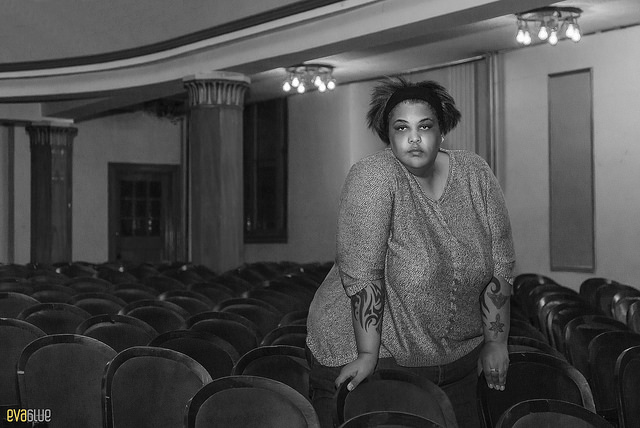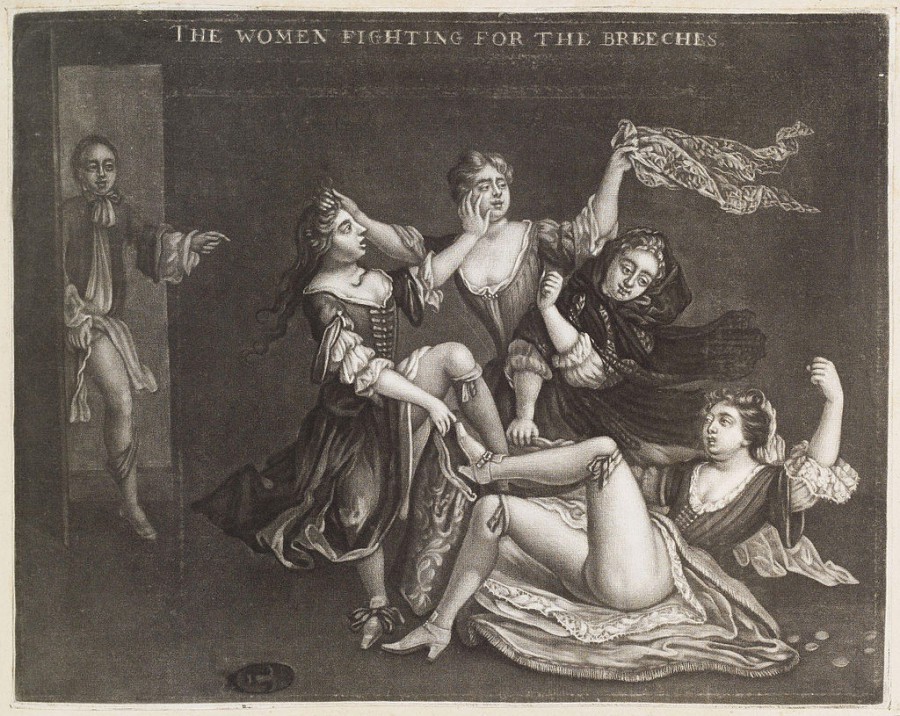by Melissa Brooks
When I first moved to the San Francisco Bay Area, I rented a bedroom in a house co-owned by a middle-aged woman and her twenty-six year old son. The son didn’t live there, but the mother did, making her simultaneously my landlord and roommate. Three weeks went by and despite the awkward set up, I thought things had mostly been going okay. No arguments had ensued and we regularly asked after one another’s wellbeing. I made sure to clean up after myself, stay out of the way, respect her privacy and be quiet. So it came as a shock when one day she spontaneously started yelling at me, boldly proclaiming that “this situation” wasn’t working for her and she didn’t like me. Confused by what I had done to offend her, she boiled down her hostility to a single trite creed:
“Women can’t get along.”
The flagrant hostility from someone I barely knew for a slight I didn’t understand notwithstanding, I was floored by the misogyny hurtled at me by a fellow woman.
When I reflect on the event now, I guess I shouldn’t have been so surprised. After all, she was simply voicing a creed that many women are bombarded with from early childhood on. She, like me, like all American women, are products of a culture that insists that, at the very least, it’s difficult for women to get along, and at worst, that women are too catty to be friends. In this insistence, our culture perpetually pits women against each other and teaches us to judge, compete against and stomp on one another. While most of us don’t flaunt the misguided belief that women generally can’t get along, based on my personal experiences as well as everything that the media, film, literature, art and music have assailed me with my entire life, it seems like this belief is ingrained within and has guided the behavior of many women (including me) at some point in their lives.
In a recent listicle on Bustle called, “5 Things You Might Not Think Are Anti-Feminist, But Are,” Claire Warner cites the mantra, “I’m not like other girls,” as damaging to both the women who purport it and the women this mantra judges (in short, all women). Unfortunately, this mantra is all too common. Maybe you even adopted it at one point, perhaps in high school or college. Maybe you dubbed yourself the cool girl—“you know, just one of the guys.” Gillian Flynn provides a spot-on description of “the cool girl” in Gone Girl (the novel and film):
That night at the Brooklyn party, I was playing … the Cool Girl. Men always say that as the defining compliment, don’t they? She’s a cool girl. Being the Cool Girl means I am a hot, brilliant, funny woman who adores football, poker, dirty jokes, and burping, who plays video games, drinks cheap beer, loves threesomes and anal sex, and jams hot dogs and hamburgers into her mouth like she’s hosting the world’s biggest culinary gang bang while somehow maintaining a size 2, because Cool Girls are above all hot. Hot and understanding … Men actually think this girl exists. Maybe they’re fooled because so many women are willing to pretend to be this girl.
In high school, I more or less stopped spending time with my female friends in favor of hanging out with my older brother and his friends—a bunch of boys. Pretty soon, I came to think of myself as a girl who got along better with boys. I remember saying that I could no longer handle “the drama,” the gossip, the rivalries that I had experienced with female friendships. I liked being with boys because it seemed we could hang out without such petty judgments. We could just casually enjoy one another’s company as we played video games, watched movies or smoked a bowl.1
As I’ve grown older, I’ve realized how damaging this mindset is. Adopting the attitude that “you’re just not like other girls,” that “you’re one of the guys,” that “you’re the cool girl” necessarily assumes that femininity is inferior to masculinity, that women are inferior to men. It assumes girls and women are so unlikely to be cool that you need to pin this flimsy adjective to yourself to proclaim your difference, your separation, from the “uncool” herd comprising the rest of your gender. It assumes it’s up to men to decide what makes women cool. When you insist that women can’t get along because there’s too much drama or whatever other reason you’ve been force fed over your lifetime, when you insist that you’re not like other girls, when you go so far as to eschew female friendships for this reason, you not only seek the approval of men for validation of your identity, you become complicit in your own oppression. As Warner says, you imply that women are lesser beings, thereby exacerbating the sexist, misogynistic attitudes espoused by our culture at large.
Although you may want to reject your womanhood, you can’t completely do that. As long as you identify as a woman, as long as you look like a woman, you will still be counted as a woman, aka, one of the “uncool,” lesser beings you yourself deemed your gender to be. Try as you might to separate yourself and stand apart, our culture will not make an exception for you. At home, at school, at work, at the gym, out with your friends, out on your own, you will continue to receive the same sexist, misogynistic treatment all women face on a daily basis. A man will interrupt you with the underlying assumption that what they have to say is more important than what you have to say. Your friends, brothers or father will debate politics while blatantly ignoring the points you make and talking past you. If you’re too quiet or shy, your employer will patronize you and treat you like a fragile piece of porcelain that will break. If you’re too argumentative, your teacher or classmates will dub you aggressive or bitchy (or attribute your behavior to PMS), while the arguments of a male classmate will be applauded as insightful. A man will get angry when you decline a cup of coffee, a beer, a date, a kiss, a sexual advance with the underlying assumption that he has a right to your body. Why compound the sexism you and other women experience daily by upholding damaging attitudes towards women?2

Roxanne Gay writes about the various factors that contribute to the difficulty of being a good feminist in her powerful essay collection Bad Feminist (if you haven’t yet, go read it right now. Seriously, go do it. She has way more important, insightful things to say than I do). If you don’t associate with the word feminism because you fear its negative connotations, please read this; on the other hand, if you don’t associate with the word feminism because you feel the movement has historically been exclusionary, particularly of women of color, I see your point. Instead of the difficulty of being a good feminist, I’ll say the difficulty of being good to other women, and being good to yourself as a woman. As resolute as we may wish to be, as much integrity as we wish to uphold, we all falter in our convictions.
In her essay, “How to Be Friends with Another Woman,” Gay zeroes in on the way women are constantly pitted against each other that can subsequently make them reticent to develop and maintain friendships with one another3—this issue where I and so many other women continue to falter. The second listicle I’ll cite, Gay provides some very practical advice on how to overcome the notion that women can’t get along, the notion that it’s better to “not be like other girls,” that it’s better to be “like a guy.” Some poignant examples:
1: Abandon the cultural myth that all female friendships must be bitchy, toxic, or competitive. This myth is like heels and purses—pretty but designed to SLOW women down.4
1B. If you find that you are feeling bitchy, toxic, or competitive toward the women who are supposed to be your closest friends, look at why and figure out how to fix it and/or find someone who can help you fix it.
3. If you are the kind of woman who says, “I’m mostly friends with guys,” and act like you’re proud of that, like that makes you closer to being a man or something and less of a woman as if being a woman is a bad thing, see Item 1B. It’s okay if most of your friends are guys, but if you champion this as a commentary on the nature of female friendships, well, soul-search a little.
3A. If you feel like it’s hard to be friends with women, consider that maybe women aren’t the problem. Maybe it’s just you.
3B. I used to be this kind of woman. I’m sorry to judge.
5C. Don’t tear other women down, because even if they’re not your friends, they are women and this is just as important. (p. 48-49)
As Warner and Gay are getting at, all too often, we’re ready to dismiss each other as women. When we do that, we buy into the notion (albeit inadvertently) that we truly are inferior as women. In trying to conform to the “cool girl” image, we may hope to raise ourselves as individuals above our inferior status by becoming what we perceive men want us to be, in order to be accepted, to be dubbed “superior,” “better,” even “normal” to that other chick’s “crazy.” We do this at the expense of each other, and we do it in order to be positively sanctioned by men.
I don’t blame any woman for doing this. I don’t blame myself for having done this. To expect any individual woman to be “above this” and criticize her when she’s not is to miss the point and perhaps, even contributes to the continued subjugation of women. When you’re brainwashed with an idea from the time you emerge from the womb, it’s extraordinarily difficult to radically change your perspective. Basically, you are set with the task of undoing your socialization and re-socializing yourself. As Warner writes:
“It’s still easy to fall into the trap of distancing ourselves from our gender. Femininity is so looked down upon in society that we’re encouraged to dissociate ourselves from other women, especially when you consider how women are consistently pitted against each other in ways that men never experience.”
Latent skepticism of other women and even potential hatred inflicted inward for being a woman—fearing deep down that you may actually be incompetent, unworthy, less capable than those around you—all too often becomes instinctual.
If this is a point where you falter in the fight for the equality of all women, recognize the ways this attitude impedes the equality of other women and yourself. In this acknowledgement, commit to actively combatting your prejudice against your own gender every day. Don’t just soul-search a little; soul-search a lot. And keep doing it for as long as you have to in order to undo this harmful attitude. With luck, you’ll wake up one day and no longer anywhere in the back of your mind think that women can’t get along, and that it’s better to be “like a guy.” But even if you’re never able to completely eradicate these thoughts, keep combatting them.
I’ll tell you this—the best, most dependable, most understanding and compassionate friends I’ve had over my lifetime have almost always been women.5
End Notes
1. And yet, what I failed to realize at the time was that this “casualness” was emblematic of the vapidity driving these relationships. When I wanted to be “just one of the guys,” I lacked real intimacy. And maybe this was specific to my situation and the people I spent my time with, but regardless, I always ran (and continue to run) into some kind of barrier when I tried to develop a solid friendship with heterosexual, cis men. If I did grow close to a guy, more often than not, I’d learn that he had misinterpreted my friendship for romantic interest, and when the truth came out, he lost interest in the bond I thought we shared. If it wasn’t romantic interest, it was usually a general dismissiveness—I was just someone’s little sister, someone’s cousin, someone’s girlfriend. More often than not, I found myself to be just a nice ornamental decoration to game night rather than my own person, a dynamic individual with complex wants and needs. Sure, I’ve had plenty of nice, heterosexual, cis male friends over the years, but most of the time, I couldn’t depend on them when I needed someone the same way I have time and again been able to return to my women friends. Time and again, those bonds have proved themselves to be stronger, deeper, more intimate and more fulfilling.
2. For more examples of the pervasive sexism women experience every day, check out James St. James’ excellent article, “These 25 Examples of Male Privilege from a Trans Man’s Perspective Really Prove the Point.”
3. Otherwise known as “girl on girl crime,” as Tina Fey put it so eloquently in Mean Girls.
4. Because the first line is so good, we’ll temporarily overlook the fact that Gay puts down femininity in the second. Putting down femininity places traditionally masculine traits in a superior role, while casting femininity as something frivolous and ignoring the fact that many women enjoy expressing their femininity. There’s nothing wrong with enjoying “heels and purses,” and in fact, for many women, expressing their femininity is an integral part of their personalities.
5. See #1: If you’re a woman who adamantly insists women can’t get along, you not only become complicit in your oppression, you’re denying yourself an unparalleled joy and fulfillment that I think women are more often willing to offer than men. I truly believe strong friendships with women will improve your life.
 Melissa Brooks is Assistant Editor at The Thought Erotic and an MFA student in fiction at the University of San Francisco. Her stories and essays have appeared in Gravel, The Molotov Cocktail, Ginosko, Driftless Review and Vannevar.
Melissa Brooks is Assistant Editor at The Thought Erotic and an MFA student in fiction at the University of San Francisco. Her stories and essays have appeared in Gravel, The Molotov Cocktail, Ginosko, Driftless Review and Vannevar.
Image Licensed Under Creative Commons Attribution 2.0:
“Roxanne Gay – Montreal – 2015” by Eva Blue.



2 thoughts on “Why Can’t Women Just Get Along?”